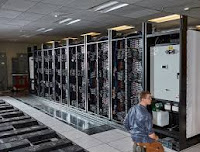In this episode, Introduction to Quantum Computing . . .
Welcome back to On the Fly, the podcast where we delve into fascinating and occasionally complex topics that pique curious minds. Today, we’re exploring something that sounds like it’s straight out of a sci-fi movie: Quantum Computing. Don’t worry if you’re not a tech expert—I promise to keep it simple, fun, and full of real-world analogies.
So, let’s start with this question: Have you ever been stuck in traffic and wondered, “What’s the fastest way to get to my destination?” You open your favorite map app, which calculates the best route in seconds. But imagine if it could consider every possible route, even ones you never thought of, all at once. That’s similar to what quantum computing can do—but on a much larger scale.
Classical vs. Quantum Computing:
To understand quantum computing, let’s first discuss the computers we use every day. These classical computers process information in binary—ones and zeros. Think of it like a light switch, either on or off. Your phone, laptop, and even the large supercomputers NASA uses all operate this way, toggling billions of these “light switches” each second to run programs and solve problems. Quantum computers don’t follow conventional rules. Rather than being simply on or off, quantum bits—or qubits—can exist in states of on, off, or even a combination of both simultaneously.
Imagine flipping a coin. A classical computer would determine whether it landed on heads or tails. In contrast, a quantum computer allows the coin to spin in mid-air, analyzing every possible outcome at once. Pretty cool, right?
Here’s another way to think of it. Imagine a maze. A classical computer would navigate the maze step by step, trying one path at a time until it reaches the exit. In contrast, a quantum computer investigates every path simultaneously, quickly discovering the fastest route out. This capacity to process large volumes of information at once could transform areas such as medicine by accelerating the design of new drugs or logistics by optimizing delivery routes for entire cities. It’s like supercharging problem-solving with a rocket engine.
Companies Leading the Quantum Computing Revolution:
Some of the world’s most prominent tech players and innovative startups are working on quantum computing. IBM has pioneered its IBM Quantum program, offering cloud access to quantum machines.
Google made headlines in 2019 when its quantum computer, Sycamore, achieved “quantum supremacy” by solving a problem no classical computer could solve in a reasonable amount of time. Microsoft is developing its Azure Quantum platform, while smaller companies like Rigetti Computing and IonQ are making significant strides with their unique approaches. And let’s not forget D-Wave, known for its specialized quantum annealing machines.
What About Supercomputers?
Meanwhile, supercomputers are still incredibly powerful and essential for many tasks. The previous leader is Frontier, housed at Oak Ridge National Laboratory in the U.S. It’s the first exascale computer capable of performing over a quintillion calculations per second. But there’s also El Capitan, a groundbreaking exascale supercomputer at Lawrence Livermore National Laboratory in California, online in January 2025. El Capitan will surpass Frontier in performance, designed to handle two exaflops—or two quintillion calculations per second. While Frontier focuses on various tasks, El Capitan is tailored for national security applications like nuclear simulations. Both represent the cutting edge of classical computing and highlight the incredible progress made alongside quantum developments.
Historical Context:
It’s important to remember that the concepts behind quantum computing have existed for decades. Pioneers in quantum mechanics, such as Erwin Schrödinger and Richard Feynman, first theorized about the potential of quantum computers in the mid-20th century. It’s a testament to human ingenuity that we’re now on the verge of realizing this decades-old dream.
Why Aren’t We All Using Quantum Computers Yet?
So, why doesn’t everyone carry a quantum computer in their pocket? Well, they’re tough to build and even more challenging to maintain. Qubits are extremely sensitive and must be kept at temperatures colder than outer space to function correctly. They also tend to make errors more frequently than classical computers. Scientists are tackling these challenges, but it’s like trying to construct a house out of soap bubbles—delicate and tricky!
Ethical Considerations:
While quantum computing offers great potential, it also raises significant ethical concerns. One major issue is its possible impact on cybersecurity. Quantum computers could undermine many of the encryption techniques we depend on today, which may jeopardize sensitive information. Nonetheless, this challenge also creates an opportunity to develop new, more secure encryption methods that can withstand quantum attacks.
The Future of Quantum Computing:
Even with these challenges, quantum computing is advancing rapidly. Companies and research labs worldwide are racing to build better quantum machines. And while they won’t replace classical computers anytime soon, they’ll work alongside them to tackle problems we’ve never been able to solve before.
So, the next time you’re stuck in traffic, remember: one day, quantum computing might not just find the fastest route—it might redesign the entire traffic system to make sure no one gets stuck in the first place.
Thanks for joining me on this journey into the fascinating world of quantum computing. If you enjoyed today’s episode, please share it with a friend who loves learning new things.
I’m Patrick Ball, reminding you to stay curious and ask questions.


Comments